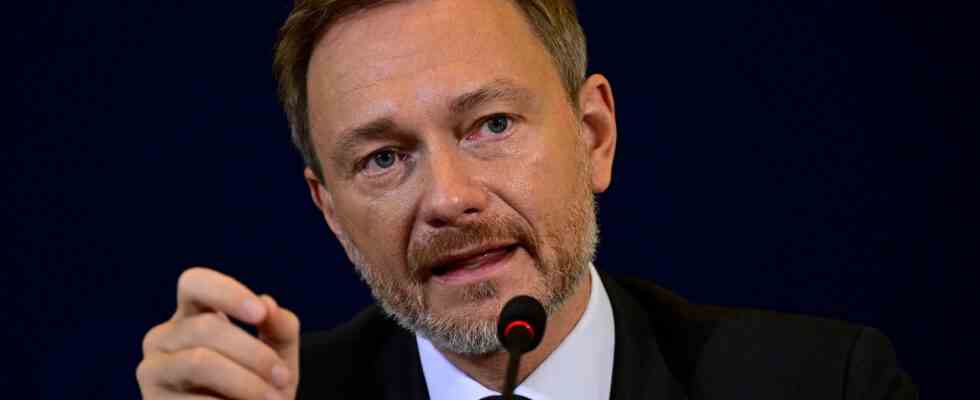Status: 09/26/2022 2:22 p.m
Finance Minister Lindner is already making plans for a gas price cap in his head. And always has the debt brake in mind. The traffic light is increasingly in agreement that an alternative to the gas surcharge is needed quickly.
Officially, the gas surcharge is to come into force in a few days – the surcharge, which millions of gas customers would have to pay to compensate for higher procurement costs, should take effect from October 1st. But politically, the gas surcharge is on increasingly shaky ground. Doubts are also growing within the traffic light coalition as to whether the measure is really the right way through the energy crisis.
In any case, Federal Finance Minister Christian Lindner seems to have found his position: Away with the levy and on with a gas price cap. But it shouldn’t be there at any price.
Discussion about gas price brake instead of gas surcharge
Frank Jahn, ARD Berlin, daily news at 2:00 p.m., September 26, 2022
After a meeting of the FDP presidium in Berlin, the party leader pushed for a “fast pace” when changing to the gas price cap. Extraordinary measures would have to be taken “very quickly” to compensate for the burden on private households and companies. But for Lindner, the change is linked to one condition: the debt brake must be adhered to. Otherwise there is a risk of a “fiscal dam bursting,” the minister warned. If the debt brake were to fall, he believes that not only would measures to mitigate the energy crisis and inflation be financed, but also other political wishes and projects. Lindner emphasized:
We want to help people in the crisis, but we don’t want to open the floodgates.
According to his own words, the Federal Minister of Finance already has a concept in mind as to how a gas price brake can be implemented while complying with the debt brake. For the time being, however, Lindner is keeping to himself what these plans look like. First of all, he wants to discuss this with the partners in the traffic light coalition.
Consumers should pay the surcharge “not even temporarily”.
But in view of the approaching start of the gas surcharge, the time pressure is also increasing. SPD General Secretary Kevin Kühnert is also aware of this. Nevertheless, he demanded: “In our view, nobody in Germany should have to pay this levy, not even temporarily.” Otherwise, some form of refund must be considered.
Kühnert is aware of one thing – an alternative to the gas levy will be expensive. According to the SPD general secretary, billions are at stake. But he was convinced: “This money can be found. This money will be found.”
Not an “Oscar-ready” performance
From the point of view of the Greens’ federal chairman Omid Nouripour, it can hardly be prevented that the gas surcharge will come into force at the beginning of next month – for the time being. Because when asked exactly when the gas levy could be tilted, Nouripour replied to the broadcasters RTL / ntv: “As soon as possible.” The Greens chairman also refers to talks in the federal government that the situation is dynamic.
Within the traffic light, people are also aware that the coalition with the supposed quick gas levy is not doing well. SPD General Secretary Kühnert put it as follows: “The people involved know that it wasn’t quite worthy of an Oscar.”
Financing through special funds?
The parliamentary group leader of the SPD, Rolf Mützenich, admitted in the ARD morning magazine also stated that “the gas surcharge is not the method of choice – especially considering that we have taken important companies into state care”. He sees constitutional concerns and promises clarity by the end of October. In questions of financing, he brings a supplementary budget and the “establishment of a special fund” into play.
SPD leader Saskia Esken also showed up Report from Berlin open to the possibility of a new fund. That would have the advantage that the assets could still be raised this year, when there is still an exception to the debt brake, according to Esken. As a further option, she brought the nationalization of the energy suppliers into play.
Scholz is keeping a low profile
It is still completely open how things will continue after a possible end of the gas levy. Chancellor Olaf Scholz is keeping a low profile on the question of the allocation and options. During his trip to the Gulf region, he only emphasizes the general goal of lowering the “far too high prices” for electricity and gas. Scholz referred to a commission of experts that is currently examining various models. They met for the first time on Saturday. He expects “quick results,” said the Chancellor.
Similar tones came from a government spokesman today: He also assured that the structure of an overall solution would now become visible “very quickly” and in a very orderly process. This solution is based, among other things, on the work of the expert commission. And the Federal Ministry of Economics, whose department head Robert Habeck is considered the initiator of the gas surcharge, said that an “orderly solution” had to be found. To meet the current main objectives: to reduce gas prices and ensure security of supply.
Gas allocation wobbles, gas price brake more likely
Martin Polansky, ARD Berlin, September 25, 2022 7:32 p.m

